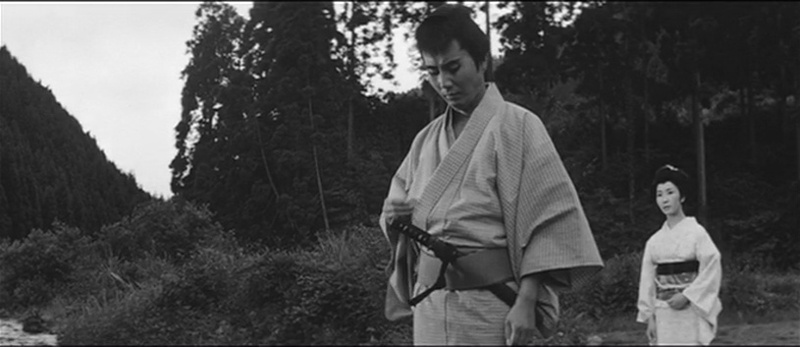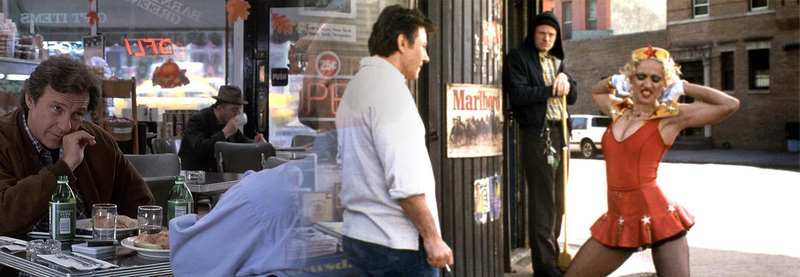
Patience, Pressure, and a Final Massacre
MOVIE REVIEW
The Betrayal (Daisatsujin orochi)
–
Genre: Action, Drama
Year Released: 1966, Radiance Films Blu-ray 2025
Runtime: 1h 27m
Director(s): Tokuzō Tanaka
Writer(s): Rokuhei Susukita; Seiji Hoshikawa; Tsutomu Nakamura
Cast: Raizō Ichikawa, Kaoru Yachigusa, Shiho Fujimura, Ichirō Nakatani, Ryūtarō Gomi
Where to Watch: available September 16, 2025, pre-order your copy here: www.radiancefilms.co.uk, www.mvdshop.com, or www.amazon.com
RAVING REVIEW: THE BETRAYAL begins with a single decision that sets everything else in motion. A loyal warrior is asked to shoulder a false charge of murder to shield his clan from political fallout. He accepts with the understanding that he’ll go into hiding for a year and then be welcomed back once the storm has passed. But what sounds like a temporary sacrifice quickly mutates into a permanent exile. Promises evaporate, protections vanish, and the clan that asked for loyalty quietly abandons him. From that point on, the film is less about one man’s mistake than about how an entire system uses honor as both carrot and weapon.
Tokuzō Tanaka structures the story with deliberate patience. The early passages emphasize waiting—our protagonist believes the recall will come, believes in the rituals and intermediaries meant to safeguard him. Yet scene by scene, the walls close in. Letters are delayed, officials speak in coded phrases, and every appeal for clarity gets lost in a chain of bureaucratic evasions. What emerges is a portrait of bushidō not as a noble creed but as a mechanism for passing blame downward. The critique is sharp precisely because it is never itself; it’s embedded in procedures, silences, and a thousand small acts of avoidance.
At the center is Raizō Ichikawa, whose performance anchors the film. He begins committed to duty, convinced that honor functions as a two-way street. Over time, that conviction erodes, and Ichikawa shades the character with fatigue and a sense of disbelief. By the latter acts, he’s transformed into a figure who has stopped expecting reciprocity altogether. The shift is quiet but devastating. Known for performances marked by poise and swagger, Ichikawa here embodies erosion—his character’s dignity rubbed away one denial at a time. The emotional impact is cumulative, and by the final stretch, his presence alone communicates the betrayal more effectively than any speech could.
THE BETRAYAL makes striking use of black-and-white widescreen. Tanaka frames courtyards and corridors like chessboards, arranging bodies within boundaries that highlight the protagonist’s lack of freedom. Movement is restricted, blocked, redirected; the spaces themselves seem complicit in his entrapment. While the violence adheres to 1960s studio constraints—blood is implied rather than shown—the film finds other ways to convey brutality. Exhaustion, labored breathing, the tremor in a hand gripping a sword: these details carry more weight than spectacle.
All of this builds to a finale that justifies the long setup. After carefully tightening the screws for most of its runtime, Tanaka unleashes a climactic battle that is as exhausting to watch as it must have been to perform. Swords break, and improvisation becomes survival. The fight shifts terrain and tactics with coherence, never losing its sense of space or stakes.
If the film falters, it’s in the middle stretch. The fugitive journey adopts a tempo of encounter and escape that risks feeling formulaic: an ally appears, a skirmish ensues, a betrayal surfaces, and the cycle repeats. On paper, this repetition reinforces the theme of systems grinding people down through sameness. In practice, some viewers may find the narrative to be wheel-spinning.
The high-definition transfer preserves the precision of Tanaka’s widescreen compositions, while the uncompressed mono track gives the sound design a clarity that enhances the sense of pressure. A newly commissioned subtitle translation corrects earlier gaps, ensuring the film’s subtleties aren’t lost. Supplemental materials—audio commentary, video essays, and a printed booklet—provide historical and thematic context, underscoring the film’s place in the broader conversation about postwar jidaigeki.
Taken as a whole, THE BETRAYAL is more than just another samurai tale. It’s a study in how loyalty can be weaponized, how codes of honor can serve power rather than principle, and how individuals are discarded once their usefulness ends. Tanaka directs with restraint until it matters most, then delivers a climax that rivals the genre’s finest. For fans of Japanese period cinema, it’s not just a rediscovery—it’s a revelation. Cold, pitiless, and unforgettable, this belongs alongside the era’s most searing indictments of duty and sacrifice.
Bonus Materials:
High-Definition digital transfer by Kadokawa
Uncompressed mono PCM audio
Select-scene audio commentary by Japanese film historian Tom Mes (2025)
Visual essay by film critic Philip Kemp, comparing The Betrayal with the original Orochi the Serpent (2025)
Visual essay on director Tokuzo Tanaka by Tom Mes (2025)
New English subtitle translation
Reversible sleeve featuring original and newly commissioned artwork by Time Tomorrow
Limited edition booklet featuring new writing by Alain Silver
Limited edition of 3000 copies, presented in full-height Scanavo packaging with removable OBI strip, leaving packaging free of certificates and markings
Please visit https://linktr.ee/overlyhonestr for more reviews.
You can follow me on Letterboxd, Instagram, Twitter, and YouTube. My social media accounts can also be found on most platforms by searching for 'Overly Honest Reviews'.
I’m always happy to hear from my readers; please don't hesitate to say hello or send me any questions about movies.
[photo courtesy of RADIANCE FILMS, MVD ENTERTAINMENT]
DISCLAIMER:
At Overly Honest Movie Reviews, we value honesty and transparency. Occasionally, we receive complimentary items for review, including DVDs, Blu-rays, CDs, Vinyl Records, Books, and more. We assure you that these arrangements do not influence our reviews, as we are committed to providing unbiased and sincere evaluations. We aim to help you make informed entertainment choices regardless of our relationship with distributors or producers.
Amazon Affiliate Links:
Additionally, this site contains Amazon affiliate links. If you purchase through these links, we may receive a commission. This affiliate arrangement does not affect our commitment to honest reviews and helps support our site. We appreciate your trust and support in navigating these links.



Average Rating